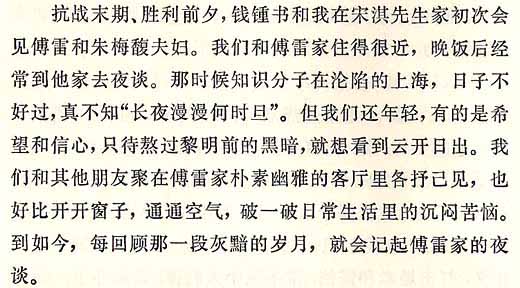Hope Against Hope
Somehow, in reading about the preceding generation, I have the feeling that my generation never suffered as they did. It is true that I was in New York City on 9/11 and I saw the WTC towers on fire before they collapsed. But that was just a one-time event, which is not quite the years of terror that the preceding generation lived through.
I am inspired and encouraged by the ineluctable optimism of my forebears. For example, I am flipping through Fu Lei's Five Translated Biographies. The preface was written by Yang Jiang, the wife of Qian Zhongshu. I was led here because of the reference in this paragraph to my father:

My translation:
Towards the end of the War of Resistance against the Japanese and the Eve of Victory, Qian Zhongshu and I first met Fu Lei and his wife Zhu Meihsiang at the home of Mr. Soong Chi. We lived close to the Fu Lei house, and we often dropped by to chat after dinner. At that time, the times were tough for intellectuals in Japanese-occupied Shanghai. The dark night was long and we did not know when dawn will arrive. But we were still young and we had hope and confidence. We only have to wait for the darkness before dawn to pass, and then the sun will rise over the parting clouds. We and our friends gathered at the simply furnished living room of Fu Lei's home to exchange our thoughts. It was a way of opening the windows to let the fresh air in, to break the monotonous boredom of daily life. Even today, when I think about those depressing times, I remember our night chats at Fu Lei's home.
Or compare to Nadezhda Mandelstam in Hope Against Hope:
I must admit to being an incorrigible optimist. Like those who believed at the beginning of this century that life had to be better than in the nineteenth century, I am now convinced that we will soon witness a complete resurgence of humane values. I mean this not only in respect to social justice, but also in cultural life and in everything else.
Far from being shaken in my optimism by the bitter experience of the first half of this incredible century, I am encouraged to believe that all we have been through will have served to turn people against the idea, so tempting at first, that the end justifies the means and "everything is permitted."
M. taught me to believe that history is a practical testing-ground for the ways of good and evil. We have tested the ways of evil. Will any of us want to revert to them? Isn't it true that the voices among us speaking of conscience and good are growing stronger? I feel that we are at the threshold of new days, and I think I detect signs of a new attitude. They are few and far between -- indeed, almost imperceptible -- but they are nevertheless there.
Alas, my faith and optimism are shared by almost nobody: people who know the difference between good and evil are more inclined to expect new misfortunes and new crimes. I realize the possibility of a return to the past, but I still think the general outlook is bright. We have seen the triumph of evil after the values of humanism have been vilified and trampled on. The reason these values succumbed was probably that they were based on nothing except boundless confidence in the human intellect.
I think we may now find a better foundation for them, if only because of the lessons we have drawn from our experience. We can see the mistakes and crimes of the past, and the seductive delusions of former times have lose their glamour. Russia once saved the Christian culture of Europe from the Tartars, and in the past fifty years, by taking the brunt on herself, she has saved Europe again --- this time from rationalism and all the will to evil that goes with it. The sacrifice in human life was enormous. How can I believe it was all in vain?
Personally, I don't know what I would have done under the circumstances of my parents. At this point, it would be pure fantasy to speculate. Still, I have this feeling that I am not temperamentally the type to sit around and chat.